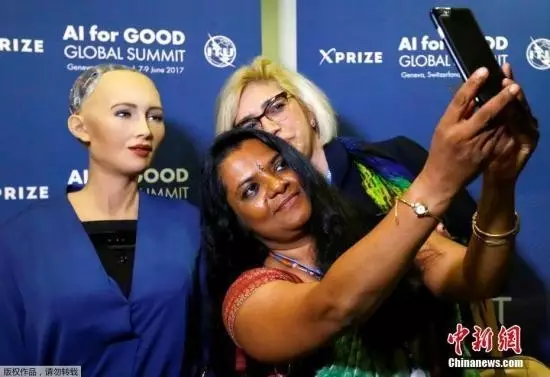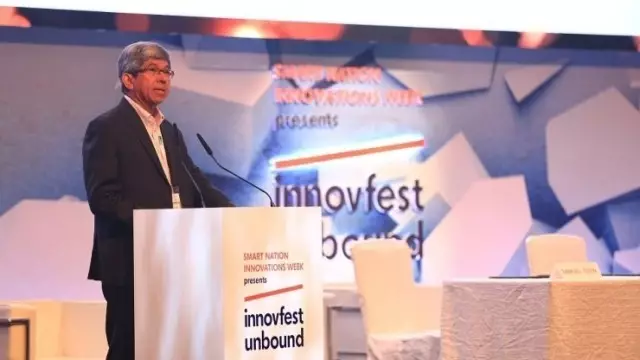| Position: Home > News Center > Special Column |
| Singapore seizes opportunities for growth in the digital economy |
| Publish Time:2020-08-26 |
|
The audience took a group photo with the beauty robot. The society's demand for artificial intelligence continues to grow "Hello, I'm Evie." When you receive an e-mail that begins with such a greeting, you may be communicating with an intelligent chatbot based on programming code and cloud technology. The author's interview with the co-founder of a Singapore artificial intelligence company was successfully implemented under the arrangement of "Yiwei". In 2014, two former Yahoo employees founded the start-up Mimetic.ai in Singapore. After two and a half years of painstaking development, in November 2016, they launched a virtual intelligent personal assistant application "Ivi" to the market. Its task is to arrange the meeting schedule for the user. Just copy the email that initiated the meeting to "Yiwei", and it will go online to communicate with the sender by email, and coordinate the parties according to the user and the sender's schedule All suitable meeting time and place. After that, "Evi" can also send schedule reminders and location information to users, and even help book conference rooms. This artificial intelligence assistant is not only able to work around the clock and across time zones, but more importantly, it never complains about hard work, and the cost is very attractive. It only pays 19 Singapore dollars a month. Even the professional version of "Ivi", which was launched on the market in July this year, has only risen to 35 Singapore dollars. Mimetic.ai is a new company that has just entered the field of artificial intelligence. For this company, the development of artificial intelligence is not only to realize the semi-automation of daily affairs arrangements, but also to develop applications that can work independently, and finally liberate people from daily affairs, so that they can focus on higher-level instructions. And cognitive work. The report released by the International Data Corporation in April predicts that the revenue generated by global cognitive and artificial intelligence systems will reach 12.5 billion U.S. dollars in 2017, an increase of 59.3% year-on-year. This revenue is expected to exceed 47 billion U.S. dollars in 2020; The investment in Zhihe artificial intelligence solutions will continue to grow significantly in the next few years. "The demand for artificial intelligence in modern society is increasing, especially for countries like Singapore. We are moving towards the goal of a ‘smart country’." said Privin Wiru, one of the co-founders of Mimetic.ai. In Singapore, there are many innovators like Weilu who are realizing smart lifestyles and reducing the burden on people's work and life. According to Singapore’s Lianhe Zaobao, the Singapore government will vigorously promote the development of artificial intelligence. The government, scientific research institutions, start-ups and even related companies will jointly strengthen this knowledge, create useful tools and train relevant talents to grasp the digital economy. Growth opportunities in the era. 1501741215(1).jpg Promote a win-win situation for the government, scientific research institutions and the industry Weilu said that at present, insufficient funds, talents and markets are the challenges of operating artificial intelligence start-ups in Singapore. “Artificial intelligence is first of all a capital-intensive industry. Investors are often reluctant to invest heavily in research and development. For example, Mimetic.ai took a long time to create minimal viable products after it was established in 2014. It wasn't until the product came out that it was able to find venturing capital. Second, Singapore’s technical talent pool is not as good as China’s, and it cannot meet market needs. "Finally, the Southeast Asian market is very fragmented, and the created artificial intelligence products need to be customized for different countries, which increases production costs and difficulties." In May of this year, the National Research Foundation of Singapore launched the AI.SG program, which is expected to change the development dilemma of artificial intelligence in Singapore. The National Research Foundation stated that it will invest 150 million Singapore dollars in this project in the next five years to fund the research expenses of the project. Specifically, this plan will aggregate six major roles, namely, the National Research Foundation, the Smart Country and Digital Government Task Force under the Prime Minister’s Office, the Economic Development Agency, the Information Communication Media Development Agency, Singapore’s Innovation Agency and Comprehensive Health Information System company. Among them, the Singapore Innovation Agency is a start-up enterprise, with entrepreneurs as the main axis, close contact with founders, investors, enterprises and government agencies, etc., to help enterprises carry out technological innovation, and support the commercialization and scale of innovation results. This core plan aims to combine the strengths of the government, research institutions, and the industry to promote the application of artificial intelligence. For the Singapore government, it needs to understand the research and development of the country's artificial intelligence industry; universities and other scientific research institutions also need the help of enterprises when they convert research results into products for market; and for many enterprises, the cost of artificial intelligence research Very expensive, they are unable to start artificial intelligence research projects alone or set up relevant expert teams. The purpose of the Singapore National Artificial Intelligence Core Program is to enable the Singapore government, scientific research institutions and industry to achieve a win-win situation. ViSENZE is a Singaporean artificial intelligence company specializing in visual search and image recognition technology. The company's CEO and co-founder Oliver Chen believes that in addition to bringing in funds, many small start-ups can reduce the high risks and costs of developing technical prototypes and minimizing viable products through cooperation with government agencies. In addition, a more well-funded and more collaborative operating system will naturally attract more talents. It is understood that ViSENZE was incubated in the "Next Generation Search Joint Research Center" jointly established by Tsinghua University and the National University of Singapore. Through in-depth research and application in the field of machine learning and computer vision technology, ViSENZE can truly realize a "what you see is what you get" shopping experience for online buyers.
Promote a win-win situation for the government, scientific research institutions and the industry
Weilu said that at present, insufficient funds, talents and markets are the challenges of operating artificial intelligence start-ups in Singapore. “Artificial intelligence is first of all a capital-intensive industry. Investors are often reluctant to invest heavily in research and development. For example, Mimetic.ai took a long time to create minimal viable products after it was established in 2014. It wasn't until the product came out that it was able to find venturing capital. Second, Singapore’s technical talent pool is not as good as China’s, and it cannot meet market needs. "Finally, the Southeast Asian market is very fragmented, and the created artificial intelligence products need to be customized for different countries, which increases production costs and difficulties."
In May of this year, the National Research Foundation of Singapore launched the AI.SG program, which is expected to change the development dilemma of artificial intelligence in Singapore. The National Research Foundation stated that it will invest 150 million Singapore dollars in this project in the next five years to fund the research expenses of the project.
Specifically, this plan will aggregate six major roles, namely, the National Research Foundation, the Smart Country and Digital Government Task Force under the Prime Minister’s Office, the Economic Development Agency, the Information Communication Media Development Agency, Singapore’s Innovation Agency and Comprehensive Health Information System company. Among them, the Singapore Innovation Agency is a start-up enterprise, with entrepreneurs as the main axis, close contact with founders, investors, enterprises and government agencies, etc., to help enterprises carry out technological innovation, and support the commercialization and scale of innovation results.
This core plan aims to combine the strengths of the government, research institutions, and the industry to promote the application of artificial intelligence. For the Singapore government, it needs to understand the research and development of the country's artificial intelligence industry; universities and other scientific research institutions also need the help of enterprises when they convert research results into products for market; and for many enterprises, the cost of artificial intelligence research Very expensive, they are unable to start artificial intelligence research projects alone or set up relevant expert teams. The purpose of the Singapore National Artificial Intelligence Core Program is to enable the Singapore government, scientific research institutions and industry to achieve a win-win situation.
ViSENZE is a Singaporean artificial intelligence company specializing in visual search and image recognition technology. The company's CEO and co-founder Oliver Chen believes that in addition to bringing in funds, many small start-ups can reduce the high risks and costs of developing technical prototypes and minimizing viable products through cooperation with government agencies. In addition, a more well-funded and more collaborative operating system will naturally attract more talents.
It is understood that ViSENZE was incubated in the "Next Generation Search Joint Research Center" jointly established by Tsinghua University and the National University of Singapore. Through in-depth research and application in the field of machine learning and computer vision technology, ViSENZE can truly realize a "what you see is what you get" shopping experience for online buyers.
The AI.SG plan has three major goals: First, to solve the problems faced by society and the industry, such as traffic congestion and population aging; second, to invest in sophisticated skills to catch up with the next wave of scientific innovation; third, to popularize labor in the industry Intelligent use, using artificial intelligence to increase productivity, create new products, and promote the commercialization of artificial intelligence solutions. The initial goal is to promote 100 such programs within 5 years, and prioritize the three areas of urban management, medical care and finance.
Medical care is currently the most important field in the development of artificial intelligence technology in Singapore. This is why the integrated health information system company controlled by the Ministry of Health of Singapore participates in the AI.SG plan. The company hopes to improve the quality of healthcare through data science, computer science, and machine learning. Lian Shuimu, President of Integrated Healthcare Information System and Chief Information Officer of Singapore’s Ministry of Health, said that artificial intelligence can play an important role in prevention, diagnosis, formulation of treatment plans, management of medication, implementation of precision medicine and pharmaceuticals.
In announcing this plan, Singapore’s Minister of Communications and Information, Yaguo, gave examples that medical professionals can use artificial intelligence to simulate emergencies or create augmented reality close to reality, allowing medical staff to communicate with virtual patients to strengthen the training of medical staff. "Augmented reality" is a technology that calculates the position and angle of the camera image in real time and adds corresponding images. The goal of this technology is to put the virtual world on the screen and interact with the real world.
AI.SG will also focus on talent training. The National Research Foundation of Singapore will launch scholarship programs to attract and train talents in the field of artificial intelligence. It is understood that Singapore’s universities are already at the forefront of the world in terms of talent training. The National University of Singapore is transforming the existing Interactive and Digital Media Institute into an Intelligent Systems Institute. Nanyang Technological University in Singapore also announced in April that it will establish a new data science and artificial intelligence research center, and invest 8 million Singapore dollars in the research center in the next three years.
At the same time, the rapid development of the field of artificial intelligence also worries some Singaporeans, worrying that the popularity of artificial intelligence will reduce employment opportunities. In an interview with local media in Singapore, AI.SG executive chairman Prof. He Dehua said, “I hope AI.SG can expand the job market and create more high-paying jobs for Chinese people. Of course, employees replaced by artificial intelligence need to be trained to be qualified for new positions. This is also a challenge that universities will face."
发送反馈
历史记录 |


